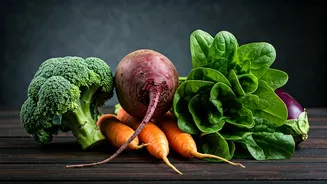Fatty Liver Explained
Fatty liver disease, characterized by excessive fat accumulation in the liver, impacts many individuals. It often stems from lifestyle choices like unhealthy
diets, excess alcohol consumption, and lack of exercise, but can also be linked to genetics and underlying health conditions like diabetes and obesity. If fatty liver disease is left unmanaged, it can escalate to more serious conditions such as liver inflammation (steatohepatitis), liver scarring (fibrosis), and even liver failure (cirrhosis). Recognizing the early signs and adapting lifestyle choices can be extremely helpful in managing and potentially reversing the damage. The first signs may be fatigue or discomfort, often leading to the need for a deeper look at dietary choices.
Leafy Greens' Power
Leafy green vegetables, bursting with nutrients, are essential for liver health. Spinach, kale, and other similar greens are rich in antioxidants, which combat the oxidative stress that can damage liver cells. These vegetables contain compounds that promote detoxification and reduce inflammation. By including leafy greens in meals, individuals can aid their livers in cleansing and support their natural functions. Incorporating these greens into your diet, whether in salads, smoothies, or cooked dishes, is a simple step towards improved liver health. Regular consumption of these nutrient-packed greens can significantly support the liver's ability to eliminate toxins and function optimally.
Broccoli and Friends
Broccoli and other cruciferous vegetables like cauliflower and Brussels sprouts are powerhouses for liver health. These vegetables contain compounds that support detoxification processes, including glucosinolates, which help activate liver enzymes crucial for eliminating toxins. By supporting the liver's detoxification pathways, cruciferous vegetables help protect against liver damage. They also reduce inflammation, aiding the liver's ability to heal and function properly. Regular inclusion of broccoli and its relatives in the diet can actively support the liver, leading to better overall health. These vegetables help to support the liver’s functionality with their crucial compounds that play a key role.
Garlic's Healing Touch
Garlic, a common ingredient in many kitchens, is a powerful ally for liver health. It contains sulfur compounds that activate liver enzymes, which are essential for detoxification. Garlic can also lower cholesterol and triglyceride levels, reducing the load on the liver. It has potent antioxidant properties, helping to reduce oxidative stress and protect liver cells from damage. Garlic's impact on overall liver function is remarkable, making it a valuable addition to a liver-friendly diet. Consuming garlic regularly can contribute to better liver function, helping to maintain it's overall health. The simple act of adding garlic to meals can make a positive difference.
Beets and Carrots
Beets and carrots, known for their vibrant colors, are also beneficial for liver health. Beets contain betaine, which helps protect the liver and reduce fat deposits. Carrots are rich in beta-carotene, an antioxidant that combats liver damage. These vegetables aid in detoxifying the liver and enhance its overall performance. They supply vital nutrients and vitamins essential for the proper functioning of the liver. Consuming beets and carrots can support the liver in cleansing, functioning, and protecting it from damage. They are both beneficial for helping to keep the liver in the best possible condition and support the processes.










![[WATCH] T20 World Cup 2026: Gautam Gambhir hosts dinner for Team India players ahead of Namibia clash](https://g-mob.glance-cdn.com/public/fc/image/7gXS1xdhs5Q0.webp)





